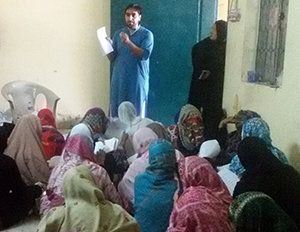Public Health
- Polio Vaccination in Pakistan
- Mobile Phone Pulse Oximeter
- Consanguineous Marriage
Student Researcher: Sameem Siddiqui
Location: Pakistan
 This project will use behavioral experiments in conjunction with a smartphone monitoring application to examine how to incentivize public employees to improve the effectiveness of public services, in this case polio vaccine distribution.
This project will use behavioral experiments in conjunction with a smartphone monitoring application to examine how to incentivize public employees to improve the effectiveness of public services, in this case polio vaccine distribution.
Pakistan is among the handful of countries that still suffers polio, and large investments being made toward eradicating it. Polio vaccinations are provided via door-to-door service delivery by government workers during monthly vaccination drives. Vaccinators are assigned to fixed geographical areas and are required to visit and vaccinate every household during each vaccination drive. However, this target conflicts with obstacles workers face in the field and leads to gaps in service delivery, even with resources spent to monitor field activity.
After building a model to predict service probability in a certain location, researchers will perform field experiments to identify the price required to obtain service at different points in space by providing geographically varied incentives. The project's goal is to minimize the cost required to reduce the gap while also improving service.
We have been exploring alternatives to developing a proprietary cellphone application for data collection. Using cellphones used in a previous experiment in this context, data collection tools using SurveyCTO were developed and piloted with a sample of nearly 50 health workers. Piloting showed that SurveyCTO has the potential of replacing a proprietary application while providing better support and flexibility in data collection.

